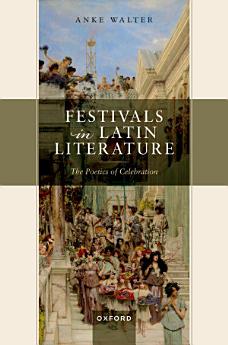Festivals in Latin Literature: The Poetics of Celebration
Apr 2025 · Oxford University Press
Ebook
240
Pages
family_home
Eligible
info
reportRatings and reviews aren’t verified Learn More
About this ebook
Festivals feature prominently in Latin literature, even in works that are not explicitly dedicated to festive days like Ovid's Fasti. Festivals in Latin Literature explores the role of festivals in elegiac, lyric, and epic poetry, as well as historiography. In all of these, festivals play a more pervasive role than has so far been realised. Tibullus' elegiac oeuvre rests on an interplay between amatory and festive poetics that even has a political meaning to it, and Propertius uses festivals in his fourth book of elegies to question, from an amatory perspective, the memory typically associated with some key Roman festivals. In the poetry of Sulpicia and Ovid's Tristia, festivals allow voices that are otherwise marginalised to shape their own fame and commemoration. Horace's Odes and the Carmen saeculare rest on an intriguing interplay of festivity in the private sphere, which forms but a fleeting and precious moment, and the monumentality of public festivals, in which the poet styles himself as a master of Roman time. Post-Vergilian Latin epicists use festivals to explore the fragility of human identity in a world dominated by the gods, in Ovid's Metamorphoses, and to question further the commemoration connected with festive days. In particular, Statius in his Thebaid undermines the foundational importance of festivals in the Aeneid, vividly staging the problematic meaning of festivals that convey a premature commemoration of an epic conflict that is unspeakable (nefas). Finally, in Livy's ab urbe condita and Tacitus' Histories, festivals both provide structure and capture long-term developments in Roman history, including Rome's rise to power and the collapse of its morals, while situating both works in broader historiographical and intertextual dialogues. The book sheds new light on these authors and works, uncovering their unique 'festive poetics'. It demonstrates that Latin literature adds important new aspects to our general understanding of festivals, which, as seen throughout the book, offer even richer avenues of creating meaning and shaping or questioning commemoration than is often assumed.
About the author
Anke Walter is Senior Lecturer in Classics at Newcastle University. Her primary research interests are the construction of time in ancient literature, stories of origin, and ancient (especially Latin) epic poetry. She completed her PhD in Heidelberg in 2011, with a thesis on storytelling in Flavian epic (published as 'Erzählen und Gesang im flavischen Epos', Berlin 2014) and her 'Habilitation' at Rostock in 2018, with a thesis on 'Time in Ancient Stories of Origin' (published with OUP in 2020). Anke has (co-)edited volumes on stories of origin, ancient narrative and exemplarity, literature and religion, and the temporality of festivals.
Rate this ebook
Tell us what you think.
Reading information
Smartphones and tablets
Install the Google Play Books app for Android and iPad/iPhone. It syncs automatically with your account and allows you to read online or offline wherever you are.
Laptops and computers
You can listen to audiobooks purchased on Google Play using your computer's web browser.
eReaders and other devices
To read on e-ink devices like Kobo eReaders, you'll need to download a file and transfer it to your device. Follow the detailed Help Center instructions to transfer the files to supported eReaders.





